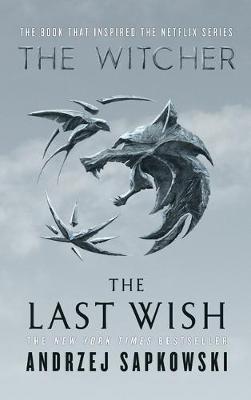Before you read this review, you should know that I loathe short stories. I prefer my stories on the larger side, full of world building and character development, and complete with a conclusive ending or a second installment that will lead to a conclusive ending. As many short stories in a collection are, well, quite short and typically end without any further discussion of what happened in the previous short story, I don’t like them. There are always exceptions to this rule, but unfortunately, "The Last Wish," is not one of them.
That being said, I did not know the first book in the Witcher series would be a short story collection, so color me unpleasantly surprised. I picked up this book as a result of my current obsession with the Witcher 3: Wild Hunt. Jumping into the game without any knowledge of the previous installments in the Witcher, it was obvious that there was a deep and rich background—especially with the characters—in its world, cultures, races, magic, and literally everything. To attempt to somewhat understand even an iota of this complexity, I delved into the first book. I was sorely disappointed by the contrast of the massive game to the very simplified book and its short stories.
What’s more, was that I was surprised with the writing of the book, (I never have very high hopes for books adapted from video games—although in this case, the book came first); though more simple than its fantasy compatriots, it managed to depict the bleak life and even grimmer outlook of Geralt, a Witcher, or superhuman monster hunter, with a few moments of quiet greatness. At one moment, Geralt aptly depicted his shunning by most humans—even the ones who needed him to save their lives—as such:
“I manage because I have to. Because I’ve no other way out. Because I’ve overcome the vanity and pride of being different. I’ve understood that they are a pitiful defense against being different.”
Though I was pleasantly surprised by somewhat eloquent moments like this, I was, however, disappointed to find only glimpses of past histories hinted at in the game and a very narrow glimpse of the vast world we see in the games. I felt like these short stories were the perfect framework for an adaptation, as much of the meat and bones were missing, and it would be very easy for a movie or video game to fill in the rest as they pleased.
What annoyed me even more was that Geralt narrated each of the short stories to one of his friends, meaning that the chapters jumped from past Geralt to present Geralt in a very jarring way. Most times, I felt that the short story couldn’t be over, and then was forced smack dab into an injured Geralt’s present recuperation in a temple. I was also repeatedly frustrated by the lack of description for the monsters, having to google images for “striga” and “sylvan” to get any idea what our hero was facing—and I’ve even played the game.
This lack of description applies to the backstories of the characters as well. I was particularly hoping to learn more about Geralt’s experience in becoming a Witcher, and was only somewhat satisfied. The “how” of Geralt becoming a Witcher was mentioned as almost an aside, marking him as a victim of the same law of surprise that affected another character.
“He was taken from his home because he was what his father hadn’t expected to find on his return. Because he was destined for other things. And by the power of destiny he became what he is.”
This is all that was mentioned about Geralt’s evolution into a Witcher. This mention was during the action of a short story and wasn’t really delved into or mentioned again, except for other vague references. I felt almost cheated by the lack of development, but was more aghast by the feeling that the video game would have handled it better, but it was most certainly true.
But one thing the book has in common with the video game is that my favorite part of the collection of involved Yennefer. The story was the titular entry, “The Last Wish,” where Geralt met Yennefer—an extremely powerful sorceress and arguably, the love of his life—for the very first time. I loved Yennefer’s confidence, power, and intellect. She instantly and masterfully bent Geralt to her will and the results were absolutely hilarious. She truly shone as the female heroine of my dreams. In contrast, I hated Geralt’s bard friend, Dandelion—yes, his name was actually Dandelion—as a blatant and annoying plot device that I could only pray would get killed off by his own stupidity in the rest of the series. I couldn’t even fathom that Geralt would deem to associate with a bard, let alone such a stupid one. And sadly, Dandelion was present in more than one of the short stories and in the damn present.
Regardless of Dandelion’s existence and the uncomplicated and simple writing, I decided to give the rest of this series a shot. The next book in the series is another collection of short stories, which I hoped to power through as well, until I got to the actual first novel in the saga, "Blood of the Elves." Ultimately, if you were picking up this book hoping for a heart wrenching, conflicted account of a boy being forced into becoming a Witcher, undergoing excruciating experiments, trials, and training, you most certainly would not find it any of the short stories of these books. If, however, you were looking for a simple book to supplement your enjoyment of the video game or to read at bedtime, this would be the perfect read for you.
